
NO SINGLE ISSUE likely impacts more people on the planet than energy. Not only does it brighten our lives, move us around and enable us to communicate, it powers the supply chains that feed us, house us, clothe us and provide us with life-saving medicines. Internationally, energy shapes global politics, fueling economic development and creating pathways to prosperity for millions while also being a source of geopolitical conflflict and a challenge to global sustainability.
At Tulane, the Freeman School has been at the forefront of energy education for decades. Energy fifinance, markets and trading have long been part of the Freeman curriculum, and graduates have gone on to leadership roles in the industry’s biggest companies, from Shell, Chevron and ExxonMobil to NextEra, Constellation and Entergy. ThThe Freeman School established its first MBA concentration in energy in 1999, and former Dean James W. McFarland launched the Tulane Energy Institute in 2003 to house all the school’s energy activities under a single roof.
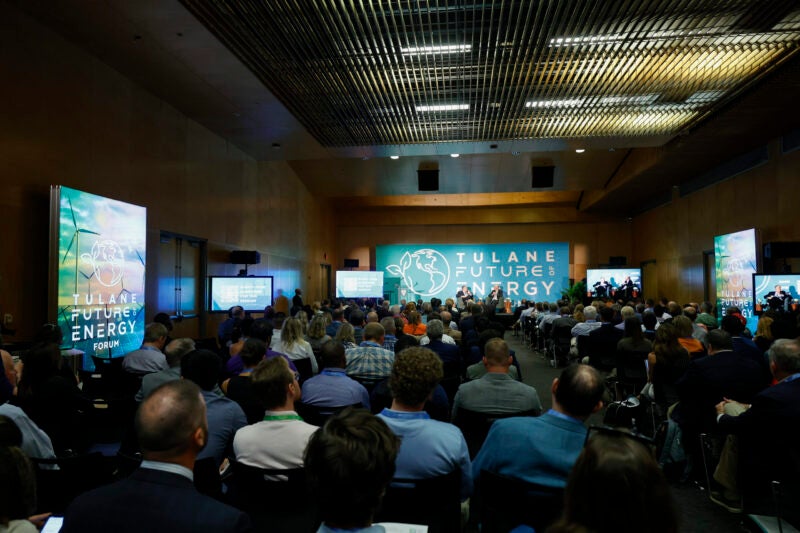
The Tulane Future of Energy Forum took place in September, bringing together experts from academia, industry, government and non-profits to discuss issues and opportunities in the energy space. Photographs by Tyler Kaufman.
The Freeman School is also a big part of the Future Use of Energy in Louisiana (FUEL) initiative. Founded in January 2024 and funded by the record-setting NSF Engines grant, the initiative will provide up to $160 million over 10 years to a coalition of universities, industry partners, government entities and other stakeholders to support scientific innovation focused on making Louisiana a global leader in the energy transition. Along with lead grantee Louisiana State University, Tulane is a central player in the initiative, with the Freeman School, the School of Science & Engineering and the Tulane Innovation Institute expected to contribute research, market analysis and commercialization expertise.
“Challenges and opportunities in complex areas such as energy and the environment require an all-hands-on-deck approach with contributions from a wide array of fields,” Tulane President Michael A. Fitts said. “Tulane is proud to offer its expertise to this vital effort which will help ensure both the economic vitality and environmental leadership of our home state.”
In November 2024, Tulane took another big step into the energy space with the inaugural Future of Energy Forum. The three-day conference brought together experts from academia, industry, government and nonprofits to discuss opportunities and challenges in the energy business. In addition to sessions spanning virtually every source of energy — from fossil fuels to wind, solar, biomass and nuclear — the forum covered important topics such as carbon capture and storage, grid resiliency, renewable tax credits and energy security. Leveraging Tulane’s academic expertise and industry connections, it presented the public with an objective, authoritative, technology-neutral snapshot of the industry.
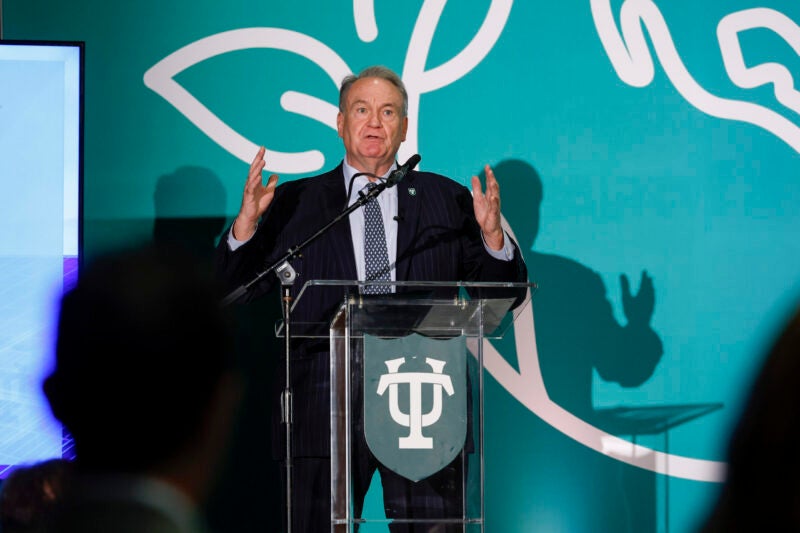
Speaking at the forum, Tulane President Michael A. Fitts announced plans for a new interdisciplinary institute dedicated to addressing the nation’s critical energy challenges.
The conference drew more than 1,000 attendees to Tulane’s uptown campus and confirmed what many at the university suspected: There’s strong public interest in energy expertise and Tulane has the resources to deliver it.
Encouraged by the success of last year’s forum, President Fitts and Provost Robin Forman reached out to Freeman School Dean Paulo Goes, Tulane Law School Dean Marcilynn Burke, and Tulane School of Science & Engineering Dean Hridesh Rajan and requested that they form a steering group to help plan an institute that would consolidate, collaborate and advance energy studies at Tulane.
At this year’s Future of Energy Forum held in September, Fitts gave this effort a name, announcing plans to develop the Tulane Institute of Advanced Energy Studies. The institute will unite energy research and programs across the university and spur the interdisciplinary collaboration needed to generate real-world solutions to one of society’s greatest challenges.
“This flagship institute will serve as an umbrella for all our energy centers and initiatives, connecting energy research and education across science, engineering, law, business and beyond,” Fitts said.
Combining the expertise of the Freeman School, the Law School and the School of Science & Engineering makes sense. Besides being among the university’s biggest contributors to the FUEL initiative, the Freeman School operates the Tulane Energy Institute and the School of Science & Engineering leads energy-related scientific research, with a focus on developing materials that address problems in sustainability and energy storage. Tulane Law School, through its Energy Law & Policy Center, also has a long history of energy studies, bringing together experts in technology, economics, law, regulation and policy to provide multidisciplinary analyses of issues facing the U.S. and global markets.
“The idea isn’t to replace what we’re doing individually at our schools but to aggregate and leverage it,” says Goes, “to find a mechanism for Tulane to disseminate fact-based, non-partisan, technology-neutral knowledge to the public.”
“Energy Studies is really ‘Everything Studies,’” says Forman. “Intersecting in fundamental ways with everything from geopolitics and national economies to personal finance and transportation to issues of environmental impact and sustainability, the study of energy is a great example of the value of Tulane’s commitment to crossing boundaries, and our distinctive ability to build and sustain conversations and collaborations that not only cross disciplinary boundaries within the academy but also transcend the boundaries of our campus to engage business leaders, public officials and other community leaders.”
In announcing his plans for establishing the Institute of Advanced Energy Studies, Fitts praised three faculty members in particular for their work in moving the effort forward: The Freeman School’s Pierre Conner, executive director of the Tulane Energy Institute; the School of Science & Engineering’s Daniel Shantz, Entergy Chair in Clean Energy Engineering and associate dean for research and PhD programs; and Tulane Law School’s Frédéric Sourgens, the James McCulloch Chair in Energy Law and director of the Tulane Energy Law & Policy Center.
Collectively, the three represent nearly 90 years of experience in the energy space as practitioners, researchers, scholars and analysts.
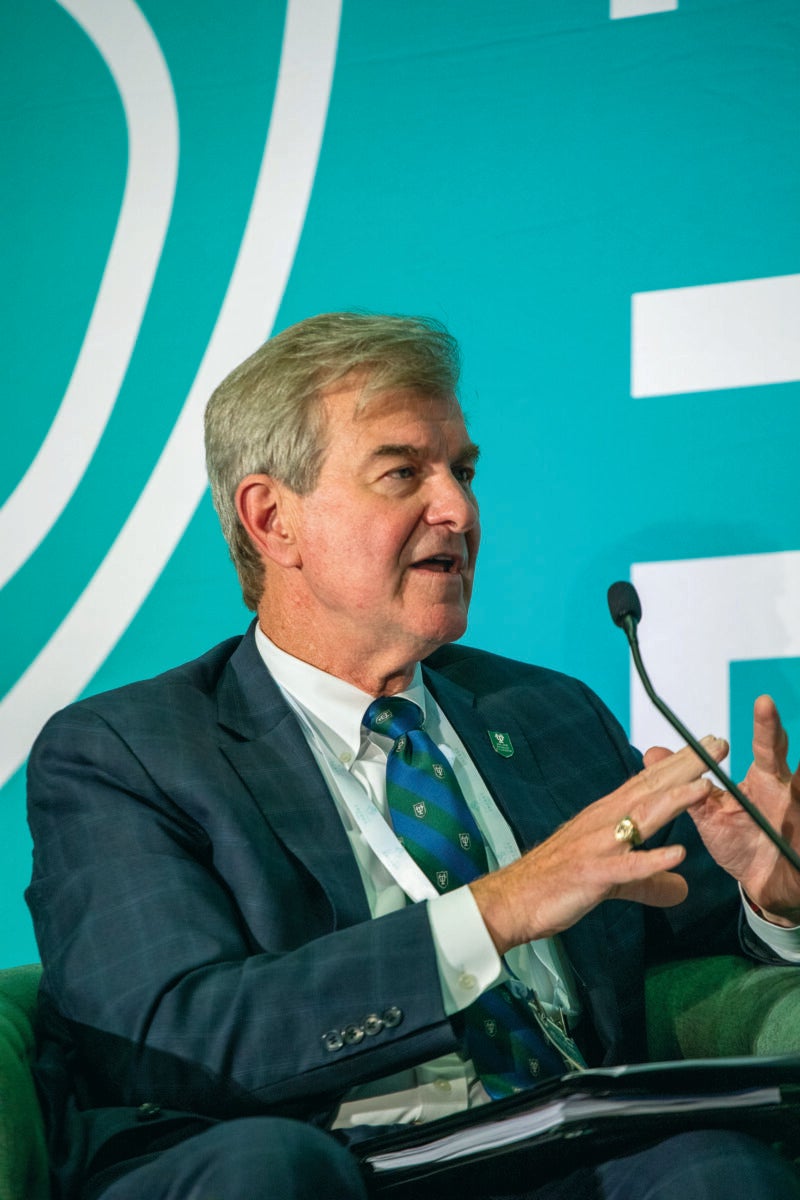
Pierre Conner is the Executive Director of the Tulane Energy Institute and Professor of Practice, Management Science.
ENERGY is not just the topic du jour,” asserts Pierre Conner. “It’s going to be the focus for the foreseeable future.”
Conner, executive director of the Tulane Energy Institute, has the history to make that claim. He’s spent more than 40 years in the business, as a drilling engineer and manager with Exxon, as an equity analyst and president with Capital One Securities, and now as a professor of practice in finance and administrator at Tulane. You could say energy runs in his blood: Both his grandfathers worked in the oil fields of southwest Louisiana; one conducted the seismic survey for the state’s very first offshore oil well.
Analysts often refer to the energy trilemma of security, affordability and sustainability, the often-conflicting challenges that define the space. Conner says those issues are poised to become even bigger hurdles in the coming decade.
Recent events back up Conner’s assessment. The Nord Stream pipeline blast in 2022 triggered an economic crisis in Germany, highlighting the need for greater energy security. Driven largely by AI data centers, electricity demand is rising for the first time in decades, and prices are following suit. Total energy-related carbon dioxide emissions increased by 0.8% in 2024, hitting an all-time high.
Focusing too intently on any one of those challenges, Conner says, can have deleterious impacts on others. Spain, for example, invested heavily in renewable energy over the last decade, eventually generating two-thirds of its power from wind and solar, but an April 2024 blackout across the Iberian Peninsula crippled the country and wiped nearly $500 million from its economy.
The solution, Conner argues, is rigorous interdisciplinary research and analysis to determine the optimal mix of energy sources, technologies and policies.
“We’re finding that these things have come to a focal point,” Conner says. “If we look at the Venn diagram of security, affordability and sustainability, there’s a solution where it all overlaps.”
That’s where Tulane comes in. Conner cites a host of reasons why the university is well suited to identify and highlight those solutions, starting with its location. “We have an incredible history of energy in Louisiana,” he says.
“We understand it. We’re not a place that’s divesting of oil companies, but we also don’t believe in one solution. First Solar is building a billion-dollar solar panel manufacturing facility in New Iberia. Gulf Wind Technologies in Avondale is on the cutting edge of wind technology, and offshore wind and offshore oil and gas production share the same common DNA. We do stuff like that in Louisiana.”

Freeman School Dean Paulo Goes, left, leads a discussion with Jim Burke (A&S ’91, MBA ’92), president and CEO Vistra Energy, at this year’s Future of Energy Forum. Vistra is one the nation’s largest competitive power generators and retail electricity providers, with more than 41,000 megawatts of generation capacity powered by a diverse portfolio natural gas, nuclear, coal, solar and battery storage assets.
In addition to the culture, Conner says Louisiana’s extensive infrastructure — a network of pipelines, export terminals, railroads, ports and offshore assets — gives the state another advantage.
“We’re the molecule handler for the country,” Conner says, referring to the segment of energy that deals with the production, transportation and sale of energy in the form of physical molecules. “Texas may rival us, but we’re at the center of the molecule business for sure.”
Perhaps most significantly, Tulane itself is uniquely well equipped to become a national leader in energy education, research and analysis. With its schools of business, law and science, the university has three collaborating units with long histories and extensive activities in the energy space as well as complementary units with strong connections to energy, including the Tulane Innovation Institute, the Murphy Center and the ByWater Institute. The goal of the new institute, Conner says, will be to foster collaborations focused on developing solutions encompassing science, technology, engineering, innovation, urban planning and architecture, economics, finance, techno-commercial energy applications, political economy, law, policy, community engagement, and public health.
“We’re the right size to work on interdisciplinary problems, we’re objective and non-partisan, and the university is really supporting us,” Conner says. “We’re at a place in time where it’s important to elevate the discussion on energy, and Tulane is the place that can appropriately discuss it.”
In the wake of the NSF Engines grant, business, law and science have cross-listed a number of energy-related courses to enable students in each of the schools to extend their learning. Conner is also connecting business students with research projects in the other schools. Freeman students recently worked with Professor of Physics Matthew Escarra to provide market analysis to help commercialize his research on photovoltaic and thermal technologies and with adjunct Professor of Law Larry Khan on a project involving power utility vegetation management policies, a critical issue in the wake of recent wildfires. Tulane Energy Institute Associate Director Eric Smith, meanwhile, has worked with Professor of Earth and Environmental Sciences Cynthia Ebinger on a project to create Gulf research, energy advancement and transition scholars. Other collaborations are ongoing.
Ultimately, Conner says Tulane has the expertise, experience and industry connections needed to prepare students for careers in energy, produce high-impact research, and reliably inform the public, policymakers and capital providers on the best path forward.
“A thought leader demonstrates itself through educating people, community outreach and research,” Conner says. “The conversation about energy and the energy future should be occurring here, and Tulane should be a standout.”
AS ENTERGY CHAIR in Clean Energy Engineering at Tulane’s School of Science & Engineering, Daniel Shantz has led energy research at the school for over a decade, developing innovative new materials to address challenges in sustainability, energy storage, and solar energy capture for use in chemical conversions. In the process, he’s become good friends with his energy counterparts in the schools of business and law. That was one of the reasons why, when he was writing his proposal for the NSF Engines grant, Shantz asked Conner and Eric Smith of the Tulane Energy Institute to sign on.

Daniel Shantz is Entergy Chair in Clean Energy Engineering at Tulane’s School of Science & Engineering.
“There’s a need for people who understand business and markets,” Shantz says. “I have colleagues in chemical engineering who can take a $2,000-a-unit feedstock and do elegant chemistry to turn it into a $1,000-a-unit product. It’s cool science but a bad business model. One of the key points of the Engines grant is they want good science, but they also want to see the technology translated, so it’s integral that law, business and the Tulane Innovation Institute be involved.”
Shantz got his start in energy more than 25 years ago as a PhD student at the University of Delaware. For chemical engineering students at the time, energy was ubiquitous; Shantz focused his research on materials that could be used to enhance the refining of crude oil.
“The energy sector touches pretty much everything,” he says. “There’s obviously financial and economic issues, there’s policy and legal issues, and there are technology limitations. Finally, given these are such large capex facilities, there’s reluctance to change them.”
While there’s been a shift away from fossil fuels in recent years, Shantz says chemical engineers remain at the forefront of innovations in energy.
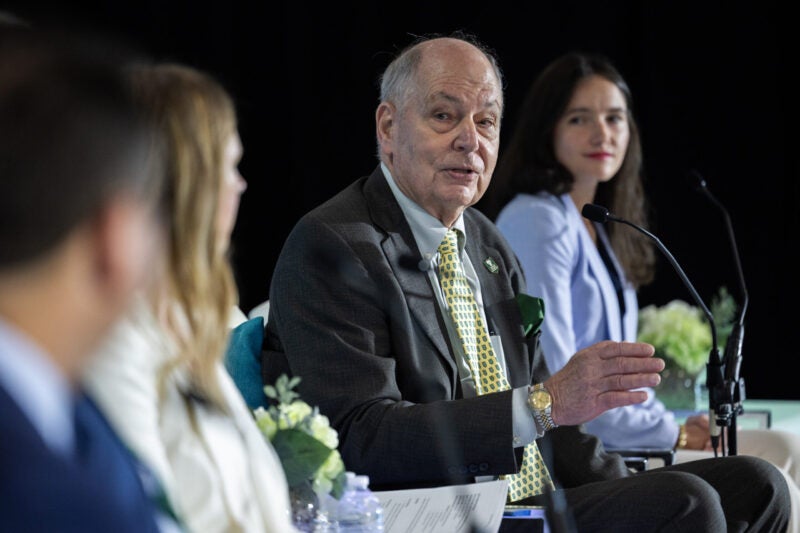
Eric Smith (MBA ’67) comments during a panel discussion on state and federal energy regulations at this year’s Future of Energy Forum. As associate director of the Tulane Energy Institute, Smith produces reports, speaks to media and teaches courses including Energy Markets, Economics and Policy, Energy Regulation, and Electric Vehicles and Supply Chain. Photograph by Tyler Kaufman.
“Chemical engineers are well suited to contribute to the solution, whether it’s new feedstocks to make molecules, whether it’s improving processes so they have a smaller energy footprint or whether it’s the circular economy,” he says. “As a society, our penchant for single-use and then landfill is problematic. We should do better than that.”
By connecting scientific research to business analysis, the cutting-edge technologies Shantz and his colleagues are developing in the lab have a better chance of actually making it to market. While the new institute’s exact scope of work is yet to be determined, Shantz says its success will be measured in impact.
“I would hope that in two years we can point to multiple activities at the graduate and undergraduate level where we’re bringing people together across schools to solve problems in the energy space.
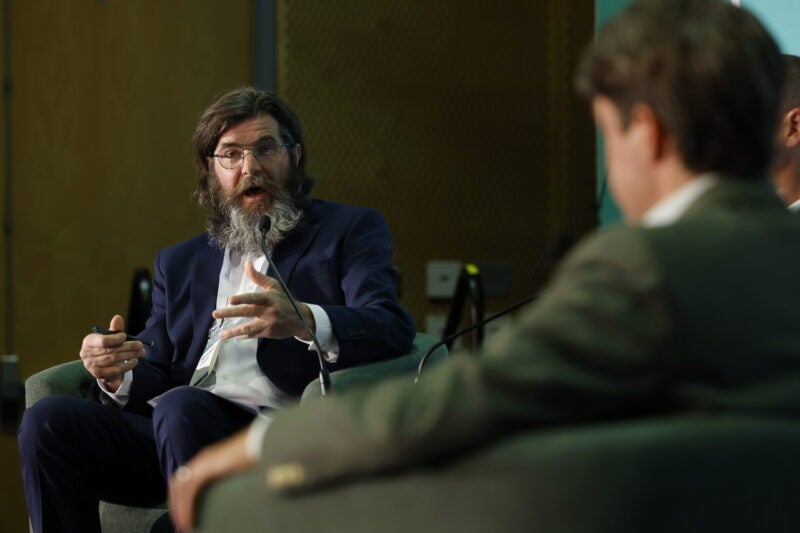
Marshall Carver (MBA ’01), professor of practice in finance, moderates a panel on power and energy storage at the forum. Carver joined the Freeman School after more than 20 years in equity and debt research, focused primarily on energy companies. Photograph by Kenny Lass.
“And I would love to see us develop training programs to help ease the interface between engineers and the business community,” he adds, “because it’s clear there’s value in having people with technical knowledge as well as a grounding in financial markets and economic reality.”
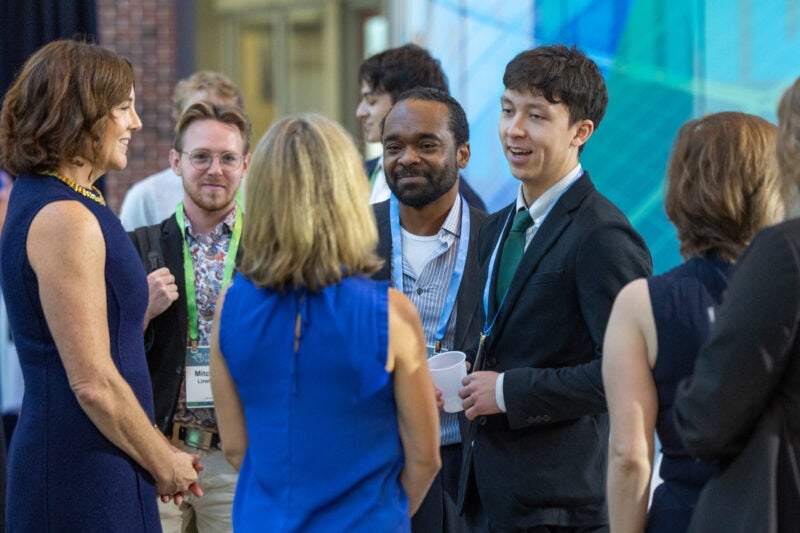
Energy students network during the Future of Energy Forum. Driven by the growing number of a jobs, Freeman’s Master of Management in Energy program welcomed its largest class in over a decade in 2025. Photograph by Tyler Kaufman.
FRÉDÉRIC SOURGENS became an energy lawyer the way most energy lawyers do: He got an energy client. In Sourgens’ case, it was a big one: Yukos Oil Co., the petroleum company owned by Mikhail Khodorkovsky, Russia’s wealthiest man, that was seized by the Kremlin in 2007. Sourgens represented the company early in his career as an attorney with Fulbright & Jaworski in Houston, and the work captivated him.

Frédéric Sourgens is the James McCulloch Chair in Energy Law at Tulane Law School and Director of the Tulane Center for Energy Law.
“Not only were these energy cases, they were energy cases that read like a Tom Clancy novel,” he recalls. “I thought I’d landed in a movie. I got to be part of some of the biggest energy stories in the world. That changed it for me.”
Sourgens went on to represent clients in energy cases spanning the globe, from Venezuela to North Africa to Mongolia, and over time, he began to see the world through a different lens.
“What it really made clear to me was that geopolitics is energy politics,” he says. “If you want to figure out how the world is moving, you need to understand how energy moves, and if you want to make the world a more peaceful place, you need to focus on energy to deescalate conflicts and set up project structures that are sustainable and lasting.
“My starting point was legal, but it was always interdisciplinary,” he adds, “because you don’t solve a problem by being a good lawyer.”
It was that desire to solve problems that led Sourgens to academia. In 2012, he joined Washburn University, eventually becoming director of its Oil and Gas Law Center. He continued that focus when he joined Tulane in 2023 as the James McCulloch Chair in Energy Law and director of the Tulane Energy Law & Policy Center. In that role, he’s worked to ramp up the center’s research impact with policy papers, studies and scholarly works to help guide policymakers to better solutions to global problems, including the energy transition.
One of things that attracted him to Tulane, Sourgens says, were the multidisciplinary resources the university could bring to bear in studying and addressing energy issues.

The Freeman School’s Marshall Family Commons hosted The Exchange, an immersive space showcasing research, breakthrough technologies and expert presentations during the Future of Energy Forum.
“The question I ask myself as an academic is what do I need to do to move the outcome an inch,” he says. “I know I’m not a businessperson. I’m a lawyer. I’m doing my piece, but I need people like Pierre and Dan to get us to a better place in the real world. That’s what motivated me into this space.”
When he first arrived on campus, Sourgens heard that President Fitts had expressed interest in hosting an interdisciplinary energy conference, but up until that point, little had been done in the way of actually planning it.
“My favorite Elvis song is ‘A Little Less Conversation, A Little More Action,’” Sourgens says. “I said, ‘Let’s not just talk about doing it, let’s actually do it.’”
Sourgens connected with his counterparts in business and science, Conner and Shantz, to discuss the conference, and the three quickly forged a friendship built around their complementary interests.
“Tell me a university where the three leaders of their respective units in energy sit within 75 yards of each other,” Sourgens says. “Anytime we have something going on, we can meet at Starbucks or PJ’s, talk about it, and then it actually gets done. That’s what Tulane brings — we can actually do it because Tulane is small enough that we know each other and are friends and big enough that we’ve got the resources to do something about the problems we see.”
In October 2023, Sourgens, Conner and Shantz organized the Tulane Energy Forum. The forerunner of the Future of Energy Forum, it featured faculty members and guests discussing a wide range of topics, including energy transition, energy access, energy justice, enhancing the grid, nuclear energy, LNG investing and more. Co-sponsored by the Tulane Energy Institute and the Tulane Energy Law Institute, the event was a resounding success, attracting hundreds of attendees and laying the foundation for interdisciplinary collaborations to come.
“When the university saw that the event was a massive success, that’s when they got behind us,” Sourgens says. “Once you get that critical mass, the chain reaction starts. That’s when you start getting really exciting things happening.”
Things are already happening. In August, Shantz organized a symposium to enable faculty from business, law and science to present their research and discuss collaborations. Through the Tulane Center for Energy Law’s Global Research Council, students are working on research related to decarbonization, alternative fuels, LNG and dispute prevention.
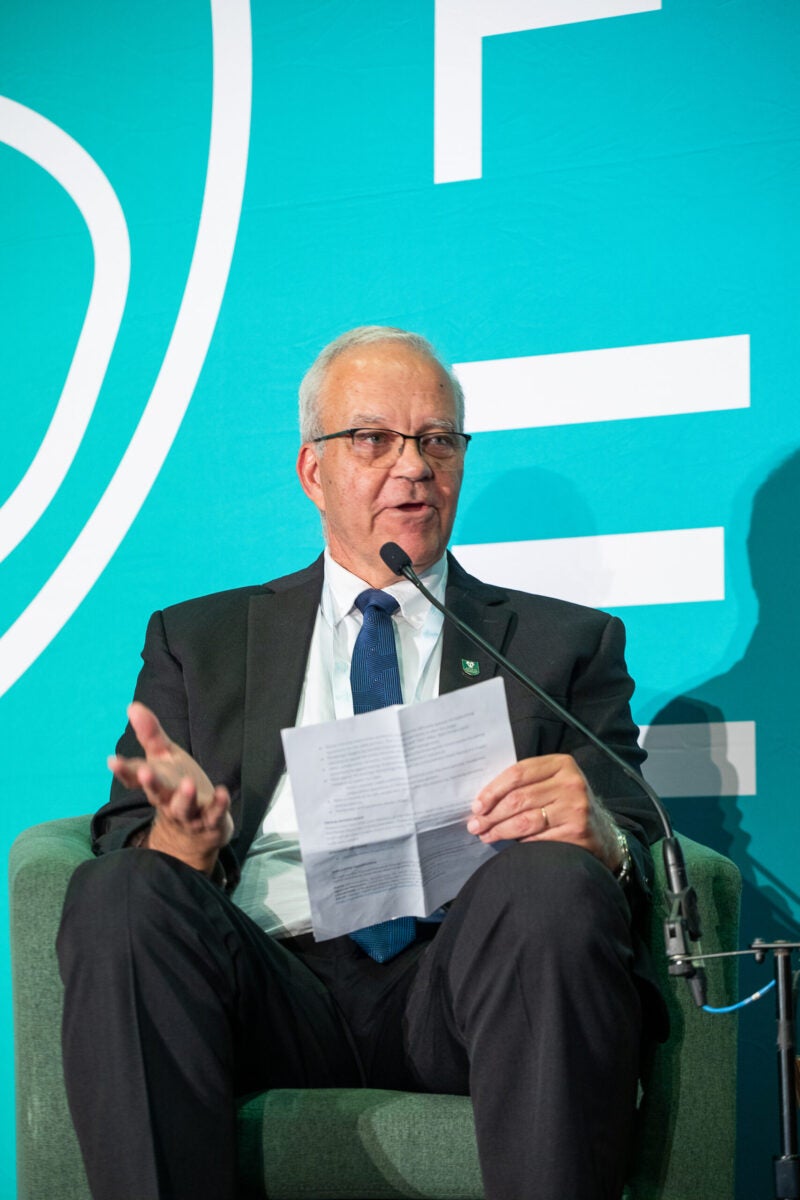
Paulo Goes is professor of management science and dean of Tulane University’s A. B. Freeman School of Business.
“I have asked Dan and Pierre to help identify students from their respective disciplines that could participate in these research streams,” Sourgens says. “So, we will have law students, engineering students, business students, and legal and industry professionals come together to put out journals and generate events.”
Ultimately, Sourgens says it’s those kinds of collaborations that make what’s happening at Tulane so special.
“You don’t find that anywhere else, where everybody just says, ‘I trust you and we’re going to do this together as a team effort,’” he says. “It’s not any one person saying, ‘It’s me.’ It’s all of us moving the chains down the field, trusting full well that if we work together, we’ll get to our goal.”
IF YOU THINK about the big problems we have to solve in energy, they cut across everything,” says Freeman School Dean Paulo Goes says. “It’s not just finding a new battery technology. You have to understand if it’s feasible, the supply-chain aspects and the legal ramifications. To really have an impact, you have to have multiple units working together.”
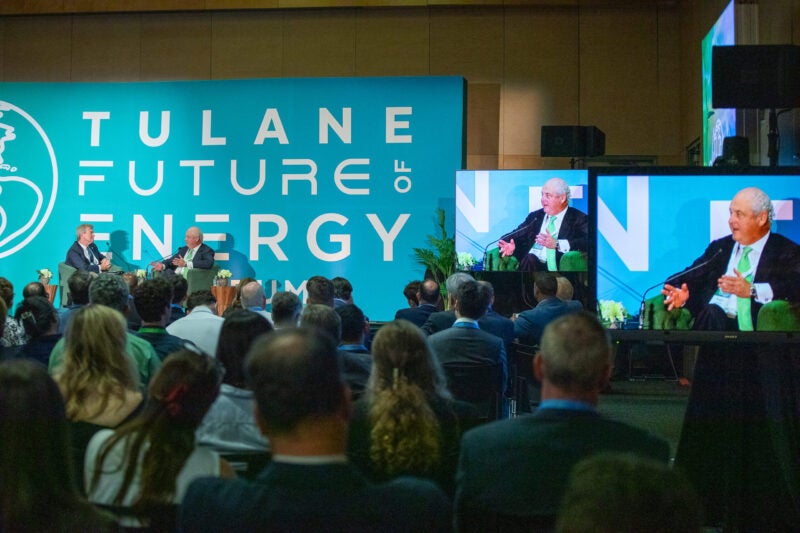
Pierre Conner, executive director of the Tulane Energy Institute, interviews Roger Jenkins (MBA ’94), the recently retired CEO of Murphy Oil Corp., during a Future of Energy Forum session.
Fitts says Tulane is the right institution, at the right time and place, to address energy’s “big problems” and chart its future.
“Just as the Future of Energy Forum convenes energy experts across disciplines and perspectives, the Institute for Advanced Energy Studies will do the same for our faculty and students,” Fitts says. “We are a world-class research university, located in one of the world’s most significant regions for energy production, that also faces unique environmental challenges. This places us at the epicenter of the next quantum leap in energy studies and technological innovation.

